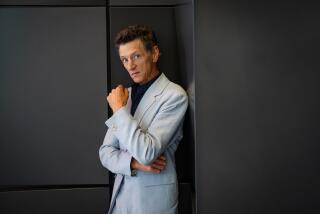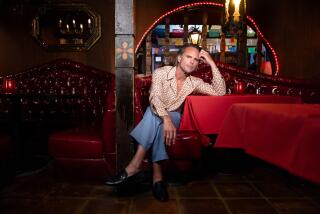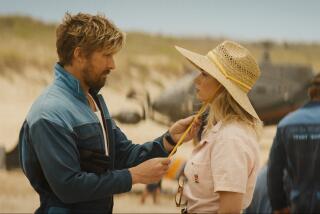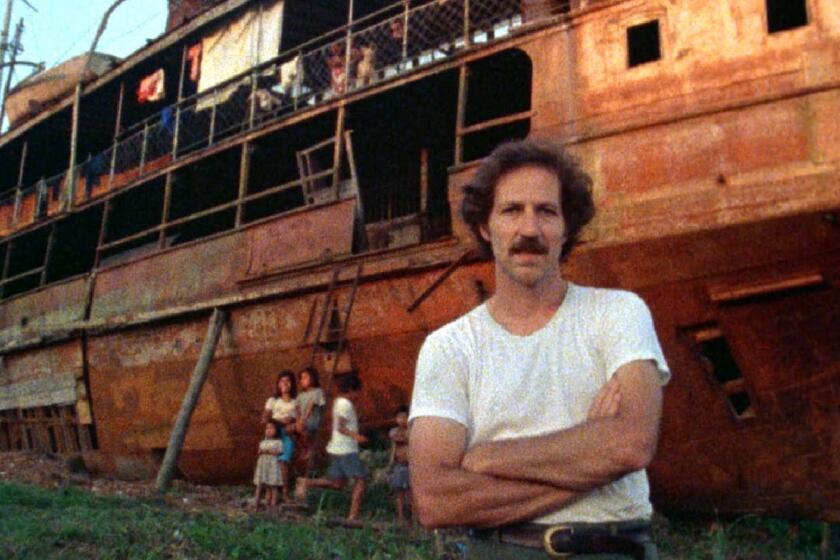Ryan Gosling again takes the plunge in ‘Blue Valentine’
He’s played a Jewish neo-Nazi, a crack-addict schoolteacher and a man who falls in love with an inflatable doll.
But suggest to Ryan Gosling, an independent-film poster child for the better part of a decade, that he chooses roles for their complexity rather than their commercial appeal and he’ll wave you aside.
“When I make these movies, I don’t think, ‘I want to make a little indie movie and I want to stay in the indie world because I think it’s cool,’” says the twinkle-eyed Canadian actor. “I make these movies and think, ‘This is the one. This one is going to be “The Blair Witch Project.”’ I’m sure of it while we’re making it. And then it comes out and it does no business.”
It’s not clear yet if the 30-year-old’s latest film, “Blue Valentine,” which opens Wednesday in Los Angeles, will become a Burkittsville-level phenomenon. (Probably not.) But it’s certain to burnish his already shiny reputation for artistic purity. The actor spent an on-and-off-period of four years shaping the character and discussing the role, one that he got so carried away with that in one scene he spontaneously climbed a fence along New York’s Manhattan Bridge and teetered 200 feet above the East River. (A producer came running from the other end of the span to stop the scene, but he finished it anyway.)
Written and directed by Derek Cianfrance, the harrowing romantic drama stars Gosling as the working-class, functional alcoholic Dean. Through a series of cleverly interwoven flashbacks and flash-forwards, Dean is seen falling in and out of love with wife Cindy ( Michelle Williams), with whom he is raising a child.
Other actors may have played Dean in a single key, but Gosling moves fluidly between different moods: torment, agitation, sweetness. As he has with many of his other characters — the neo-Nazi in “The Believer,” the teacher in “Half Nelson” (which earned him a lead actor Oscar nomination at the age of 26), the whimsical romantic in “Lars and the Real Girl” — Gosling is able to inspire an unlikely mixture of repulsion, fear and sympathy.
Compared to some of the exotic characters the actor has played before, the Dean role feels ordinary, even pedestrian. Yet Gosling says this part is closest to his heart — precisely, he says, because it’s the stuff of everyday life.
“I feel like ‘Blue Valentine’ is the biggest dog on my porch because it’s the most universal experience: What happens when love goes away,” Gosling says, sipping a latte at a Studio City cafe as night falls on a recent Friday, his red-and-white plaid shirt buttoned up against the evening chill. “It’s the ripple effect of that lost love, the shadow it casts.”
Born and raised in Ontario, the often mischievous-looking (and mischief-making) Gosling got his start as a Mouseketeer on the “Mickey Mouse Club” alongside Britney Spears and Justin Timberlake. Dropping out of high school, Gosling cut his teeth on a host of television shows, including the adventure- fantasy “Young Hercules,” before becoming an indie sensation with “The Believer” in 2001. He went on to achieve mainstream heartthrob status playing the lovelorn Noah in 2004’s “The Notebook.”
While “Notebook,” adapted from Nicholas Sparks’ novel, concerns love at its most requited, Gosling has more often been interested in romance of the tormented variety (or, in the case of “Lars,” the demented variety). It’s a subject he says has fascinated him because he’s seen how affection can turn to disgust despite so many good intentions. “There’s something I often see in people who’ve been married — a deep undercurrent of resentment toward the other person because they need them,” he said.
To tap into the brokenheartedness at the center of “Blue Valentine” (or “tuning into that frequency,” as he puts it), Gosling looked at his own relationships (he dated “Notebook” costar Rachel McAdams and is frequently rumored to be dating other actresses, including Williams), at his parents, at his coupled friends. He recalled how a pair of married friends argued strenuously, before they divorced, about the correct way to wash dishes.
“You could tell these were people who didn’t know how to address the bigger problems in their relationship,” he said. “People are fighting about these things that are not really what they’re fighting about.”
Cianfrance, meanwhile, had been wrestling with the same questions. He began the script when he was single, and although he now has a wife and child, he says he finds the issues timeless. “I wanted to make a film that’s intimate, emotional and honest about the real lives of two people,” said the director, who premiered his first feature, “Brother Tied,” at Sundance in 1998 but spent 12 years working on this one and endlessly adjusting the characters.
Although “Blue Valentine” is a prototypically independent movie — a budget of just over $1 million, more than 60 screenplay drafts — it has managed, like much of Gosling’s work, to achieve a pop-cultural and critical heft that exceeds its evident commercial potential. A hit at the 2010 Sundance and Cannes film festivals, the movie briefly became a culture war flashpoint when the Motion Picture Assn. of America gave it an NC-17 rating for a scene in which Dean performs oral sex on Cindy. (The rating was later changed to an R on appeal.)
Much of the film’s buzz centers on its emotional grittiness, which arose in part from an extensive amount of preparation by Gosling and Williams. Cianfrance, a filmmaker with a fastidious, perfectionist streak, had the pair live together in the same house as they honed their characters. They walked their dog, cooked and made home videos, all to create a more plausible marital environment (that they could then puncture in the film). Since Dean works as a mover, Gosling got hired by a moving company. Cianfrance said he expected him to carry a few boxes and call it quits; Gosling bonded with the movers and worked all day.
A willingness to plunge in headlong is a Gosling trademark. “Ryan doesn’t really know how to ride a skateboard,” Cianfrance says, describing his star’s persistence. “But he doesn’t know that. So it’s fun to watch him try to do a trick.”
If the actor has a serious, save-the-world side — he recently returned from the Congo, where he shot documentary shorts for the storytelling website MediaStorm.com — Gosling’s default mode is that of the wiseguy, often of the schoolboy sort. He is late for the interview because, he says, he ran into Andy Garcia, who talked his ear off, but how much of that is true is impossible to tell. He’s prone to baiting his producers and directors by making fun of everything from their e-mail sign-offs to their cooking quirks. He wears a kind of perma-smirk that makes him look perpetually amused by his surroundings.
And he takes manifest joy in telling a story about the specific ways Cianfrance wanted him to walk the dog that he and Williams pretended to own, particularly how he repeatedly rubbed its stomach so that it would relieve itself on said walk.
He turns serious, however, when discussing his acting motivations. “I don’t really like doing interviews because I don’t have any answers about why I act,” he says. “It’s like a compulsion. It’s people who eat and eat and eat and they don’t know why and they keep getting fatter but they can’t stop. It’s like that.... And then you find yourself on a set throwing yourself off a bridge, and you’re asking yourself, ‘Why am I doing this?’ And I don’t know.”
Director Andrew Jarecki, who worked with Gosling on his recent “All Good Things,” says that while the actor’s motivations may be instinctual, Gosling brings an uncommonly analytical approach to a set. Unlike many actors, Gosling will watch himself on a monitor between takes and keep a director off-balance by trying wildly different interpretations of the same scene, offering opinions as he goes.
He is, Jarecki says, the kind of outspoken actor who wants to have a key voice in the process, which may explain why he leans so heavily away from studio roles and their filmmaking-by-committee ways. The actor told Jarecki he wouldn’t want to make a movie in which the entire crew couldn’t fit into a single bus. “Ryan wants a direct line to the director. He’s not the kind of guy who wants to get a memo from a studio executive,” Jarecki says.
In “All Good Things,” Gosling plays a thinly veiled version of New York real estate scion Robert Durst. The movie, which like “Blue Valentine” centers on a troubled marriage, costars Kirsten Dunst and hit theaters just a few weeks ago after a cloud of release uncertainty.
Annoyed by the timing, Gosling isn’t promoting the film. “I try not to make too many movies,” he says. “I get sick of myself, so I can imagine how everyone else feels. And for the two to come out at the same time, it makes me feel sick.”
There has also been chatter that Gosling clashed with Jarecki during production. The director demurs, saying he “welcomed all the thoughts that Ryan brought to the set.”
Asked if he’s proud of the film, Gosling hesitates. “I’m proud of what Kirsten does in the movie,” he says finally. (He later elaborates: “It was a hard film to make because it was such a dark experience. Just the story itself, trying to understand the things that your gut tells you you don’t want to feel for this person. It’s an interesting experience to have, but you’re happy when it’s over.”)
Next up for Gosling is another marital-crisis film, but this time it’s a comedy: the Steve Carell movie “Crazy, Stupid, Love,” slated for release this summer by Warner Bros. (Gosling said he was so enamored by Carell’s flair for comedy when the two were shooting a pilot years ago that he’d lurk around the set on his days off just to watch him.) “I don’t want to play the same note,” Gosling said of his decision to make a studio comedy for the first time. “I feel like after ‘Blue Valentine’ I don’t know what else to do in terms of an independent romantic drama.”
But though it sounds like Gosling may be contemplating a more permanent switch to bigger productions, the shift will probably only go so far. He is, after all, still Ryan Gosling.
“I just have this total fantasy that you can make a movie like ‘Blue Valentine’ and that it can be as big as ‘Avatar,’” he said. “That’s my dream. I don’t have kids or something else more important in my life right now so I keep hammering away at it. I haven’t done it yet. But I think I’m getting closer.”
More to Read
Only good movies
Get the Indie Focus newsletter, Mark Olsen's weekly guide to the world of cinema.
You may occasionally receive promotional content from the Los Angeles Times.











